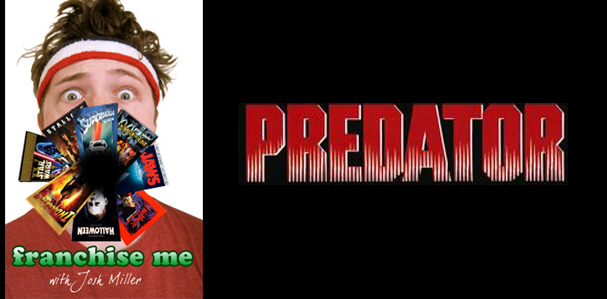
Hollywood loves a good franchise. The movie-going public does too. Horror, action, comedy, sci-fi, western, no genre is safe. And any film, no matter how seemingly stand-alone, conclusive, or inappropriate to sequel, could generate an expansive franchise. They are legion. We are surrounded. But a champion has risen from the rabble to defend us. Me. I have donned my sweats and taken up cinema’s gauntlet. Don’t try this at home. I am a professional.
Let’s be buddies on the Facebookz!
The Franchise: Predator — following the deadly encounters between a tall, dreadlocked alien race that scours the galaxy in search of dangerous species to hunt and kill — dangerous species such as man! Dun dun dunnn! The proper franchise spans three films, from 1987-2010, as well as two ancillary cross-over films featuring the xenomorphs from the Alien franchise.
The Installment: Predator (1987)
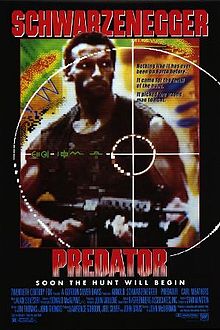
The Story:
Super badass Major Alan “Dutch” Schaefer (Arnold Schwarzenegger) and his motley team of super badasses arrive in Central America to receive details on a special top-secret mission. Dutch meets up with his old military buddy Dillon (Carl Weathers), who is now a CIA operative, and learns that a cabinet minister has been abducted by guerrilla forces deep in the jungle of Val Verde. And only one team is fucking kickass enough to rescue him. You guessed it — Dutch’s kickass team! There is only one hitch. Dillon is coming along. Well, actually there are a couple more hitches. First it turns out that Dillon was full of shit. There is no abducted cabinet minister. The real purpose of the mission was to attack the guerrillas while Dillon looks for some missing CIA agents. Furthermore, Dillon had already sent in an Army Special Forces unit looking for the agents, and now those guys are missing too. Then it turns out that the Army Special Forces unit was killed by a giant freaky alien, who likes skinning its victims and hanging the corpses from trees. As Dutch and his team attempt to “get to da choppa” for extraction, they’re hunted down one-by-one by the mysterious and generally invisible Predator, until only Dutch remains. Now it is Earth vs Predator. But one thing the Predator probably didn’t know is that Ahnuld didn’t win Mr. Earth. He won motherfucking Mr. Universe. Predator shoulda done his homework.
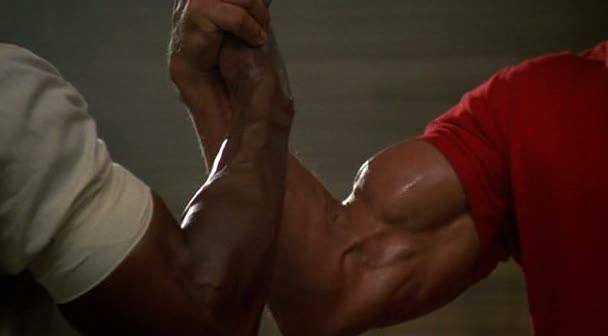
What Works:
I don’t know if overwrought simplicity can actually be a thing, but that is how I’m most inclined to describe Predator. Though Shane Black was brought in by producer Joel Silver to spice up the film’s dialogue with a host of memorably masculine one-liners, the selling point remains Jim and John Thomas’ original high-concept — what if advanced aliens came to Earth in search of dangerous prey in the same way humans went big game hunting for lions or elephants in Africa? It is a slightly silly high-concept, more suited for a pulp magazine than a big budget studio motion picture, but it has a powerful ‘cool factor’ to it. Aliens have come to Earth for a variety of reasons in movies, many of them sinister, but those sinister reasons were always things like world domination or natural resources plundering or a tasty snack. There is something almost esoteric about the idea of an alien dropping onto Earth with no agenda beyond a weekend of sporting human hunting. An alien wanting to eat you is scary, but also demeaning. An alien wanting to hang you on the wall as a trophy at least implies a modicum of respect. Which in a way is possibly more fucked up, because it serves no purpose. It is The Most Dangerous Game for a post-Star Wars world. It is a completely straight-forward idea that needs no frills. But this is 1987. Joel Silver. Shane Black. Goddamn Arnold Schwarzenegger. It is going to be all frills.
Alien became what it was because Ridley Scott treated Dan O’Bannon’s ridiculous b-movie ideas with deadly seriousness. Director John McTiernan and Joel Silver did not take that route. And they didn’t take the character-focused route they would the following year in Die Hard. Instead they detached slightly from reality and went for heightened macho melodrama. The very act of putting Arnold in any movie immediately makes it absurd. Just look at the guy. Then add Carl Weathers and Jesse Ventura to the mix, plus Bill Duke and Sonny Landham, and you’re halfway towards the cheeseball reality of The Expendables. But McTiernan finds something to latch onto, some shade of theme in all this overblown 80s-ness. And this is what makes Predator something unique and even something a little special on the action movie landscape. McTiernan doesn’t make the mistake of asking us to take the movie seriously, but he also won’t let his actors or subject matter descend into kitsch like Commando (not that I don’t love Commando, mind you). Like the Hemingway of genre cinema John Milius would do, McTiernan zeroes in on all the maleness in the project. While most of this maleness is at first played for mindless fun, in Blackian banter and typical Arnold gonzo-action, by the end of the movie it has created a sense of purpose and meaning…
The film begins with one of the most succinctly 80s-moments the 80s ever produced, when Arnold and Weathers greet each other and embrace in a hand-shake-arm-wrestle-flex-off (pictured above). It is sublimely goofy and completely transparent. A perfect moment of dumb macho for macho’s sake. And the film stays relentlessly macho. I mean, this is an action ensemble in which Carl Weathers basically plays the “ineffectual pussy” character. Think about that! But in a weird way all those biceps and testosterone enhance what is going on. The Predator is a big game hunter, and while women are certainly capable of going hunting, objectively hunting is a male pastime, especially sport hunting (ie hunting things you have no plan to eat), and doubly so when sport hunting an animal that has the capability of hunting you right back. The fallacies of this “sport” are just as present with the Predator as they are with rich Americans who go safari hunting, as the Predator has a major technological advantage over his prey. Not to project too much philosophical depth here, but even if it is just by accident Predator becomes a commentary on male pursuits and the faux sense of honor many men place on these pursuits. I’ll loop back to this in a second, but first we need to talk about the Predator.
Movie monsters are generally defined by a system of rules — vampires drink blood, die in sunlight; werewolves only transform during a full moon; xenomorphs gestate inside you; etc. What makes the Predator interesting is that his system of rules isn’t mandatory or ingrained. He isn’t a mindless animal or a supernatural being governed by predetermined impulses and weaknesses. He came across the universe to entertain himself, and his limitations are entirely self-imposed, presumably due to his own honor code. He possesses the tech to just kill all our characters in fairly short order. But doesn’t. He does not harm Anna (Elpidia Carrillo), not because he can’t, but because he doesn’t want to; it doesn’t seem sporting to him. He wants to fight scary dudes with weapons. End of story. This is the element that I think makes the film so appealing to males. The scene in which we see the Predator cleaning a human skull, clearly as a trophy, lets us know everything we need to about the alien’s motive (and the scene of the Predator tending to his wounds, Rambo-style, let’s us know he’s mortal like us). And you get the sense that the Predator is excited at the end, after he realizes just what a worthy opponent Dutch is (he doesn’t have to fight Dutch; he could just fly home if he wanted to). The Predator becomes ten times more interesting when he removes his mask and weapons to engage Dutch in a “fair” fight. When the Predator loses that fight, here is where all the malesness I was talking about comes to a head. Because the Predator doesn’t actually have any honor. What does he do when this tiny human (well, tiny compared to the Predator) improbably beats him? A samurai would give Dutch his sword or something. Not this alien asshole. The Predator activates a bomb and lets loose a great “Fuck you” laugh to go along with it. Talk about a sore loser! That one bit is what makes the movie resonate. This isn’t a story about a maniac or creature killing people in the suburbs. It is a story of thrill-seeking men, of various species, shooting at each other for no real reason in a place none of them belong. Predator is a gleefully macho film, with the machoness ultimately impugned. McTiernan has his cake and eats it too. Plus, as long as we’re on the subject of the Predator — Stan Winston’s creature design is of course a big success.
The cast. While Predator may not exactly have a collection of master thespians, McTiernan and Silver have aggregated one of the manliest casts imaginable. Jesse Ventura, with his cartoon voice and cartoon attitude, is almost too much man for any single cast. And he’s just one of many ridiculous badasses here. (Being a single woman on this set must have been grueling.) With Shane Black’s dialogue punch-ups, the cast gels shockingly well, even though we don’t know anything about the characters. It is relevant to note that the Predator does not enter the film until 34 minutes in. And even then we’re only seeing through the Predator’s POV. We don’t get a look at the creature until 41 minutes in. Yet some of the best parts of the movie are in those first 41 minutes. It is rare for a monster movie to be just as enjoyable without the monster. When the film ended I had a much stronger urge to see a prequel featuring Dutch’s team on a different adventure than I did to see Arnold fight more Predators. The characters are just so much fun, and McTiernan goes well out of his way establishing how super badass they are — all to make how easily and quickly the Predator kills them have optimal context and impact.
Arnold. I’ll admit, as hard as I try, I can’t really detach myself objectively when it comes to Arnold Schwarzenegger. For as long as I’ve had either the inclination or ability to articulately discuss art, I’ve never been able to articulately defend Arnold as a moviestar to people who don’t like/get him. True Lies in the only film he’s ever made where he demonstrates something one might recognize as or at least confuse with acting. As time eventually proved, it seems that Arnold’s film selections had as much (if not more) to do with his appeal as anything else. Yet goddammit, I love him — at least Arnold from the 80s and very early 90s. Oddly, Predator is one of his worst performances from his golden era, but it hardly matters when he’s amongst the ensemble. Ignoring how enjoyable it is to quote his terrible delivery – “Dees iz getting betta by da minute.” – Arnold is always at his best when he doesn’t have to speak and can just be physical, so the entire final section of the film clicks like crazy; his guttural and challenging bellow into the night while holding a torch is action cinema gold. No director understood how to use Arnold better than James Cameron (who, interestingly enough, also helped inspire Stan Winston’s Predator design), but McTiernan does a bang-up job too. Dutch’s introduction is perfect Arnold-style iconography, as Dutch’s crew hops off their helicopter, leaving Dutch behind to light up a giant cigar. Great intro for an Arnold hero.
Predator gets by on a healthy serving of novelty too. There just aren’t a lot of movies like it or trying to do what it is doing. Given the wilderness setting, the film’s closest cinema relative is probably the “Evil Hillbillies” subgenre, but the nature of the Predator’s technology gives everything a drastically different vibe. For most of the film the Predator feels like a cross between a robot and a ghost. Even ignoring his weaponry, he wows us with a cloaking device, audio mimicry, and heat vision. Let’s walk through these. Every hunter needs his camouflage, and the Predator has the ultimate camo. Invisible monsters are hardly new, but adding a sci-fi component makes all the difference when it comes to novelty. Though the FX is dated now, the first time you see the Predator is still a shocking one. Normally we can’t get a good look at monsters because they’re cloaked by darkness. The Predator manages to hide in broad daylight. And for whatever reason, almost being able to see the Predator is actively spookier than complete invisibility would be. And every bird hunter knows the benefit of a good bird call to lure the poor animals towards you. The Predator’s ability to record the humans’ conversations and use the audio as a trap is cool, but the real win here is how creepy the leitmotif is even when we’re just hearing the Predator fucking around with the audio by himself. Then there is the heat vision, which is easily the most iconic and imitated element of the film. Within the context of the film it lets us know that the Predator has the gizmo advantage, he’s functioning on another level. But what is really happening is villain branding. As I said earlier, we don’t get to see the Predator until halfway through the film. The presence of the heat vision gives us something more to latch onto than just regular Slasher POV would. Then, during the final battle, the Predator’s advantage becomes its weakness when Dutch learns how to disguise his body heat. That’s just good storytelling right there.
Speaking of good storytelling. John McTiernan is what pulls the whole film together. It is a ridiculous idea, stocked with ridiculous actors, delivering ridiculous dialogue. It easily could have turned out dorky or at best, so-bad-its-good. Aside from finding the right tonal balance between calculated down-beats and 80s go-for-broke, McTiernan stages some topnotch action scenes. The entire final battle is really well done, but no scene better represents the supreme excess of Predator than Blain’s (Ventura) death scene — where an aggrieved Mac (Bill Duke) picks up Blain’s mini-gun and leads the team in some light deforestation in one of the most insane ammo-wasting shoot ’em ups ever captured on film. The scene is impressive in its sheer destruction, yet McTiernan also manages to find the emotion in the moment (greatly helped by Bill Duke’s performance). This is how a macho man grieves.
Is ending the film with dopey picture credits something that “works”? Eh, probably not. But I find it hilarious.
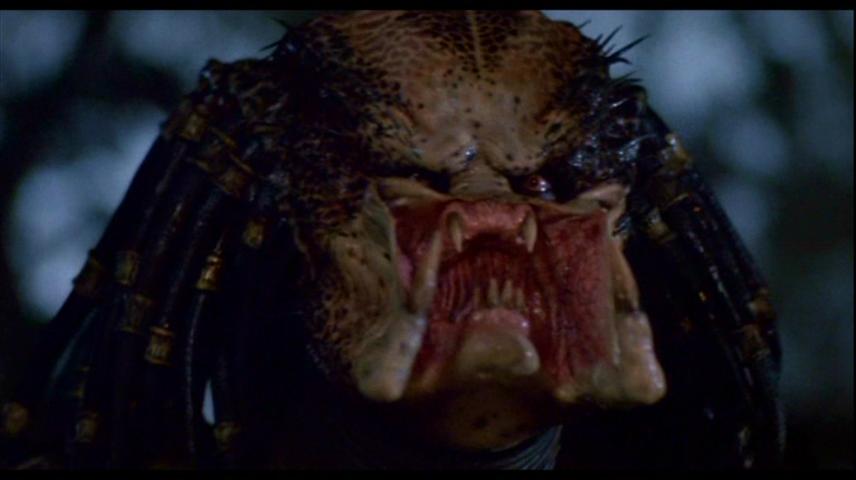
What Doesn’t Work:
While I realize that much of my philosophical ‘theme’ reading of Predator and its presentation of masculinity is probably not what the filmmakers were specifically striving for, I think the film could have succeeded even more if it had pushed just a little further into male darkness. Case in point: Dutch and his team aren’t part of the legit military, yet the film jumps through some hoops to make sure we all understand that they aren’t mercenaries. They only do rescue missions, and only noble ones at that. Dillon is portrayed as a prick for tricking Dutch into accepting the mission, even though, really, all Dillon is trying to do is rescue the first team he sent in. But Dillon is part of the CIA, so he’s sketchy, unlike Dutch and his team of, I guess, Hollywood do-gooders. This is where the weaknesses of the 80s can be seen. Some 70s gray-area would have been a nice touch, because making Dutch and his men do-gooders is just hokey and hollow Reagan-era “perfect hero” storytelling. Given the attitudes and firepower Dutch’s team possesses, this doesn’t sell well either — these guys seem like mercenaries top to bottom. But whatever, it is a movie about dudes with machine guns fighting a ten-foot-tall alien. I don’t need concrete realism. My problem is that I see a missed opportunity here. Dutch has no arc. Dillon does, though it hardly matters because he dies and isn’t our hero. Dillon is the one who was in Val Verde for the “wrong” reasons. Yet the very concept of the film seems to cry out for Dutch to have wrong reasons too. The Predator only comes to places of violence. Having Dutch be in Val Verde on false pretenses somewhat undercuts that idea by depriving Dutch of any kind of transformation. He should be a mercenary, only in it for the money and the “sport.” This film is, after all, at its core, a horror movie. It would be fitting if there was some sense that Dutch and his team deserved to be hunted by the Predator and that Dutch learned and changed from his trial by fire. Dutch is a good hero only because he is Arnold Schwarzenegger. On paper he sucks; he’s one of the least intriguing members of the team. Dillon is the interesting one, because he fucked up and has to try and make things right. He had been a badass, but now he’s gone soft. He has something to prove. Dutch is awesome and perfect, meets the Predator, stays awesome and perfect.
In my Horror 101 series I discussed what I call “monster vision,” which is a trap so many horror movies seem to fall into — trying to show us how a monster sees the world. POV camerawork is different. Jaws showed us the shark’s POV, but it made no attempt to represent how the shark actually saw things. The problem with monster vision is it usually makes things harder to see, which – aside from just being annoying to look at – bugs me on an intellectual level. How can these monsters get around so well when they can barely see? The crazy thing here is that Predator has, without a doubt, the BEST monster vision in monster movie history: the heat vision. Yet, at the end of the movie, when the Predator takes off his mask, we get treated to some of the WORST monster vision I’ve ever seen…or not seen, in this case. When the Predator removes his mask, the world becomes awash in red nothingness. I’m honestly not sure what McTiernan wanted us to take away from this, because it makes it seem like the Predator is almost completely blind. Yet he isn’t. Based on how he moves around, he can clearly see just fine. The monster vision just looks like garbage and ends the movie on a weird visual note after the iconic success of the heat vision.
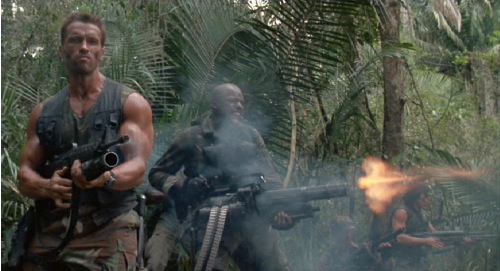
Predator Kills: 6.
Best Kill: Dillon getting his arm sliced off, which then falls to the ground still pulling the trigger on Dillon’s gun.
Best Scene: The aforementioned machine gun jungle clearing that follows Blain’s death.
Best Line:
Poncho: You’re bleeding, man. You’re hit.
Blain: I ain’t got time to bleed.
Best Predator Weapon: The wrist-guard nuke. It may be a sore loser’s weapon, but still — if you gotta go out, go out in style. Plus, Dutch’s realization of just what that wrist-guard’s beeping means is priceless.
Evidence That the Predator is a Lousy Hunter: For a guy wearing almost no skin protection or armor, the Predator allows the humans to shoot at him an awful lot. It is frankly amazing that he only got hit once.
Should There Be a Sequel: Hell yeah. The possibilities are wide open.
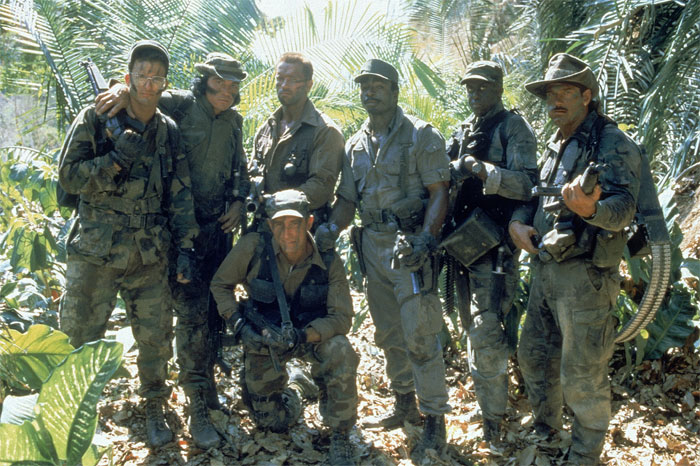
Up Next: Predator 2
previous franchises battled
Alien
Critters
Death Wish
Hellraiser
Home Alone
Jurassic Park
Lethal Weapon
Leprechaun
Meatballs
The Muppets
Phantasm
Planet of the Apes
Police Academy
Psycho
Rambo
Tremors